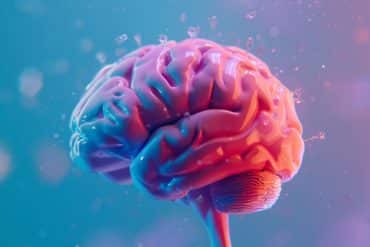Summary: According to a recent study people’s feelings about their sleep have a stronger influence on their well-being than data from sleep-tracking technology.
Over 100 participants kept daily sleep diaries and wore actigraphs on their wrists to monitor sleep patterns. The research compared these readings to participants’ personal evaluations of their sleep and their moods the next day.
The results revealed that the participants’ subjective perception of their sleep quality was consistently linked to their positive emotions and life satisfaction the next day, regardless of the actigraphy-measured sleep efficiency.
Key Facts:
- The study suggests that personal evaluations of sleep quality have a stronger influence on daily mood and life satisfaction than objective sleep-tracking data.
- When participants perceived that they had slept better than usual, they experienced more positive emotions and a greater sense of life satisfaction the next day.
- This research underscores the importance of subjective perceptions of sleep quality in maintaining overall well-being.
Source: University of Warwick
How people feel about their sleep has a greater impact on their well-being than what sleep-tracking technology says about their sleep quality, research led by the University of Warwick has found.
Across a two-week period, over 100 participants aged 18-22 years were asked to keep a daily sleep diary about the previous night’s sleep, including what time they went to bed, time they got ready to fall asleep, the amount of time it took them to fall asleep, what time they woke up, what time they got out of bed, and how satisfied they were with their sleep in general.
Five times throughout the following day, participants were asked to rate their positive and negative emotions and how satisfied they were with their life. Participants also wore an actigraph on their wrist which measures a person’s movement, for the duration of the study, to estimate their sleep patterns and rest cycles.
Researchers compared the actigraphy data with the participants’ perceptions of their sleep and how they felt throughout the following day. They wanted to find out how fluctuations from people’s usual sleep patterns and quality are related to their mood and life satisfaction the next day.
Lead author Dr Anita Lenneis, from the University of Warwick’s Department of Psychology, said: “Our results found that how young people evaluated their own sleep was consistently linked with how they felt about their well-being and life satisfaction.
“For example, when participants reported that they slept better than they normally did, they experienced more positive emotions and had a higher sense of life satisfaction the following day. However, the actigraphy-derived measure of sleep quality which is called sleep efficiency was not associated with next day’s well-being at all.
“This suggests there is a difference between actigraphy-measured sleep efficiency and people’s own perception of their sleep quality in how they link to people’s evaluations of their well-being.”
Professor Anu Realo, from the Department of Psychology at the University of Warwick added: “Our findings are consistent with our previous research that identified people’s self-reported health, and not their actual health conditions, as the main factor associated with their subjective well-being and especially with life satisfaction.
“It’s people’s perception of their sleep quality and not the actigraphy-based sleep efficiency which matters to their well-being.”
Overall, the study suggests that evaluating your sleep positively may contribute to a better mood on the next day.
“Even though a sleep tracking device might say that you slept poorly last night, your own perception of your sleep quality may be quite positive. And if you think that you slept well, it may help better your mood the next day,” Dr Lenneis added.
“On the contrary, if a sleep tracker tells you that you slept well, but you did not experience the night as such, this information may help you to reassess how well you actually slept. A sleep tracker offers information about your sleep which is typically not accessible whilst being asleep. So, it may improve your subjective perception of last night’s sleep and thereby your overall next day’s well-being.”
About this sleep and wellbeing research news
Author: Natalie Gidley
Source: University of Warwick
Contact: Natalie Gidley – University of Warwick
Image: The image is credited to Neuroscience News
Original Research: Open access.
“The Influence of Sleep on Subjective Well-Being: An Experience Sampling Study” by Anita Lenneis et al. Emotion
Abstract
The Influence of Sleep on Subjective Well-Being: An Experience Sampling Study
Previous research has associated sleep with subjective well-being (SWB), but less is known about the underlying within-person processes.
In the current study, we investigated how self-reported and actigraphy-measured sleep parameters (sleep onset latency, sleep duration, sleep satisfaction, social jetlag, and sleep efficiency) influence SWB (positive affect [PA], negative affect [NA], and life satisfaction [LS]) at the within- and between-person levels.
Multilevel analyses of data from 109 university students who completed a 2-week experience sampling study revealed that higher within-person sleep satisfaction was a significant predictor of all three components of next day’s SWB (ps < .005).
Higher between-person sleep satisfaction was also related to higher levels of PA and LS (ps < .005), whereas shorter self-reported between-person sleep onset latency was associated with higher PA and LS, and lower NA (ps < .05).
However, longer actigraphy-measured within-person sleep onset latency was associated with higher next day’s LS (p = .028). When including within- and between-person sleep parameters into the same models predicting SWB, only within- and between-person sleep satisfaction remained a significant predictor of all components of SWB.
Additionally, we found an effect of higher self-reported within-person sleep onset latency on PA and of shorter self-reported within-person sleep duration on LS (ps < .05).
Our results indicate that the evaluative component of sleep—sleep satisfaction—is most consistently linked with SWB. Thus, sleep interventions that are successful in not only altering sleep patterns but also enhancing sleep satisfaction may stand a better chance at improving students’ SWB.







